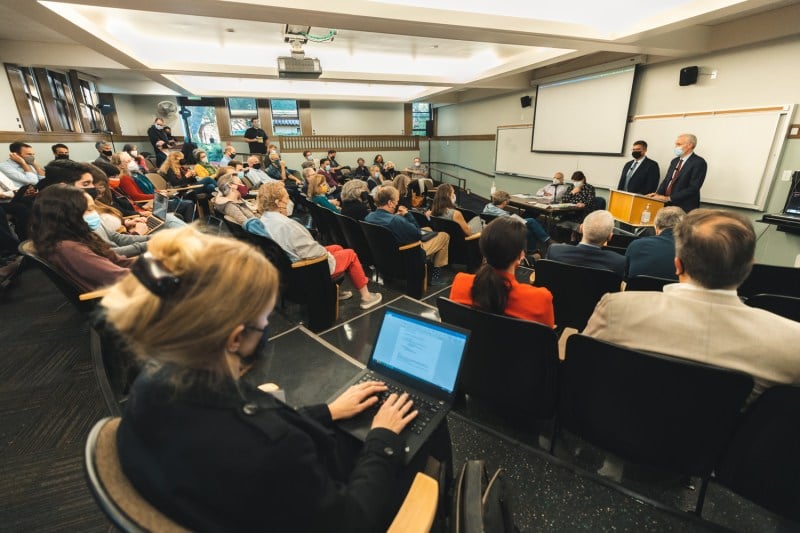At a heated Faculty Senate meeting on Thursday, senators voted to table recommendations that would make doxxing a violation of the Fundamental Standard. The decision drew outrage from some faculty senators who questioned the Senate’s inaction on doxxing that has threatened the safety of students and faculty.
The anti-doxxing recommendations were made by the Planning and Policy Board (PPB) Subcommittee on Campus Climate. The subcommittee’s members — faculty members Richard Ford ’98, David Palumbo-Liu, Stephan Stedman and Elaine Treharne, and students Grace Lee and Megha Parwani — resigned from their posts when the motion was tabled.
The vote to table the recommendations comes after Stanford reported the results of its first diversity, equity and inclusion survey, which found that widespread discrimination and harassment disproportionally affect marginalized groups on campus. Just last week, the University denounced a paid advertisement campaign funded by a conservative group that targeted political science professor Hakeem Jefferson.
The campus climate subcommittee, chaired by comparative literature professor Palumbo-Liu, was tasked in 2019 with preparing a report on “the issue of free speech and academic freedom” amid the perceived “eroding” of campus climate, according to the subcommittee’s report.
Members of the subcommittee stressed the importance of protecting students and faculty members who have faced harrassment and discrimination, especially in the form of online doxxing.
Multiple Stanford students and faculty members have fallen victim to doxxing and online harassment campaigns in recent years. Earlier this year, Emily Wilder ’20 was fired from The Associated Press after the Stanford College Republicans (SCR) publicly attacked her in targeted social media posts for her past involvement in Palestinian activism. Palumbo-Liu himself was sent death threats in 2018 after two SCR members wrote an article in The Stanford Review.
“We have found there’s a politically motivated campaign across various organizations that has gone after precisely the students, staff and scholars who embody the diversity that Stanford wishes to celebrate and advance,” Palumbo-Liu said. “I want to stress this is not a matter of free speech. It’s a matter of purposeful, malicious acts designed solely to deprive others of their free speech rights and to create fear and distrust among us.”
The subcommittee recommended that Stanford establish an anti-doxxing policy that makes it a violation of the Fundamental Standard “to feed information, by any means, to an outside organization or individual affiliated with such an organization, including media outlets, with the intent to harm.”
In its report, the committee also called for Stanford to interpret its disciplinary rules “in such a way that any malicious attack on any individual will be punished, and especially if the perpetrator has enlisted others to that attack.”
After the presentation of the report, some senators clashed in an impassioned debate.
Political science professor Judith Goldstein, a former chair of the Senate, underscored that doxxing is already against University rules, but cautioned that any measures enacted by the University must be done so with care and that the Senate should not be “quickly voting on things that sound pretty good.”
The recommendations, according to Dean of the School of Humanities and Sciences Debra Satz, were “overbroad” in the way they were written.
“What does it mean to actively protect all those who are targeted?” Satz questioned, pressing the committee to define keywords in its recommendations.
According to Ford, who is a law professor, words such as “malicious” and “harm” are typical in legal language. “It’s true that the language is general, but that’s unavoidable in a context like this before we’ve gotten to the point of actual, precise rule drafting,” he said, adding that this should not be a reason for senators to vote against the recommendations.
Hoover Institution Director Condoleezza Rice raised concerns over what she perceived as an asymmetrical focus on doxxing or online harassment instances involving conservative affiliates.
“We have to be very careful that every member of the community can see themselves in these conversations,” Rice said. The report “puts conservative students in a box.”
But members of the subcommittee stressed that recommendations were not directed at specific student groups.
“Nowhere in the recommendations did the word conservative or liberal show up,” Palumbo-Liu responded. “We have made that point over and over again. It doesn’t matter who does this. It’s a bad thing.”
Undergraduate senator Marion Santo ’23 shared with the Senate that current members of the Associated Students of Stanford University (ASSU) have been victims of doxxing campaigns.
“When they were doxxed — because anti-doxxing regulations were not and still are not included in the Fundamental Standard — no recourse was taken against those who perpetrated such actions,” Santo said.
But despite the subcommittee’s report and student testimonial, computer science and electrical engineering professor Mark Horowitz moved to table the vote on the campus discourse recommendations — a move backed by the Senate in the end.
“It was unbelievable that people could shed crocodile tears over the DEI survey and then vote to torpedo the small suggestions our committee offered to begin serious action to protect minority students, staff, and faculty of all sorts,” Palumbo-Liu wrote in a statement to The Daily after the meeting. “The amount of calculated bad faith and lack of empathy for the most vulnerable was appalling.”
Cameron Ehsan contributed to reporting.
